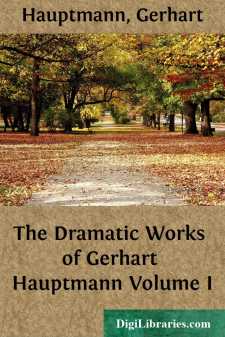Categories
- Antiques & Collectibles 13
- Architecture 36
- Art 48
- Bibles 22
- Biography & Autobiography 813
- Body, Mind & Spirit 142
- Business & Economics 28
- Children's Books 17
- Children's Fiction 14
- Computers 4
- Cooking 94
- Crafts & Hobbies 4
- Drama 346
- Education 46
- Family & Relationships 57
- Fiction 11829
- Games 19
- Gardening 17
- Health & Fitness 34
- History 1377
- House & Home 1
- Humor 147
- Juvenile Fiction 1873
- Juvenile Nonfiction 202
- Language Arts & Disciplines 88
- Law 16
- Literary Collections 686
- Literary Criticism 179
- Mathematics 13
- Medical 41
- Music 40
- Nature 179
- Non-Classifiable 1768
- Performing Arts 7
- Periodicals 1453
- Philosophy 64
- Photography 2
- Poetry 896
- Political Science 203
- Psychology 42
- Reference 154
- Religion 513
- Science 126
- Self-Help 84
- Social Science 81
- Sports & Recreation 34
- Study Aids 3
- Technology & Engineering 59
- Transportation 23
- Travel 463
- True Crime 29
The Dramatic Works of Gerhart Hauptmann Volume I
Description:
Excerpt
INTRODUCTION
I
Gerhart Hauptmann, the most distinguished of modern German dramatists, was born in the Silesian village of Obersalzbrunn on November 15, 1862. By descent he springs immediately from the common people of his native province to whose life he has so often given the graveness of tragedy and the permanence of literature. His grandfather, Ehrenfried, felt in his own person the bitter fate of the Silesian weavers and only through energy and good fortune was enabled to change his trade to that of a waiter. By 1824 he was an independent inn-keeper and was followed in the same business by the poet's father, Robert Hauptmann. The latter, a man of solid and not uncultivated understanding, married Marie Straehler, daughter of one of the fervent Moravian households of Silesia, and had become, when his sons Carl and Gerhart were born, the proprietor of a well-known and prosperous hotel, Zur Preussischen Krone.
From the village-school of Obersalzbrunn, where he was but an idle pupil, Gerhart was sent in 1874 to the Realschule at Breslau. Here, in the company of his older brothers, Carl and Georg, the lad remained for nearly four years, having impressed his teachers most strongly, it appears, by a lack of attention. For this reason, but also perhaps because his father, injured by competitors and by a change in local conditions, had lost his independence, Gerhart was withdrawn from school in 1878. He was next to become a farmer and, to this end, was placed in the pious family of an uncle. Gradually, however, artistic impulses began to disengage themselves—he had long modelled in a desultory way—and in October, 1880, at the advice of his maturer brother Carl Hauptmann proceeded to Breslau and was enrolled as a student in the Royal College of Art.
The value of this restless shifting in his early years is apparent. For the discontent that marked his unquiet youth made for a firm retention of impressions. Observation, in the saying of Balzac, springs from suffering, and Hauptmann saw the Silesian country-folk and the artists of Breslau with an almost morbid exactness of vision. Actual conflict sharpened his insight. Three weeks after entering the art-school he received a disciplinary warning and early in 1881 he was rusticated for eleven weeks. Nevertheless he remained in Breslau until April, 1882, when he joined his brother Carl and became a special student at the University of Jena. Here he heard lectures by Liebmann, Eucken and Haeckel. But the academic life did not hold him long. Scarcely a year passed and Hauptmann is found at Hamburg, the guest of his future parents-in-law and his brother's. Thence he set out on an Italian journey, travelling by way of Spain and the South of France to Genoa, and visiting Naples, Capri and Rome. Although his delight in these places was diminished by his keen social consciousness, he returned to Italy the following year (1884) and, for a time, had a sculptor's studio in Rome. Overtaken here by typhoid fever, he was nursed back to health by his future wife, Marie Thienemann, and returned to Germany to gather strength at the Thienemann country house....




